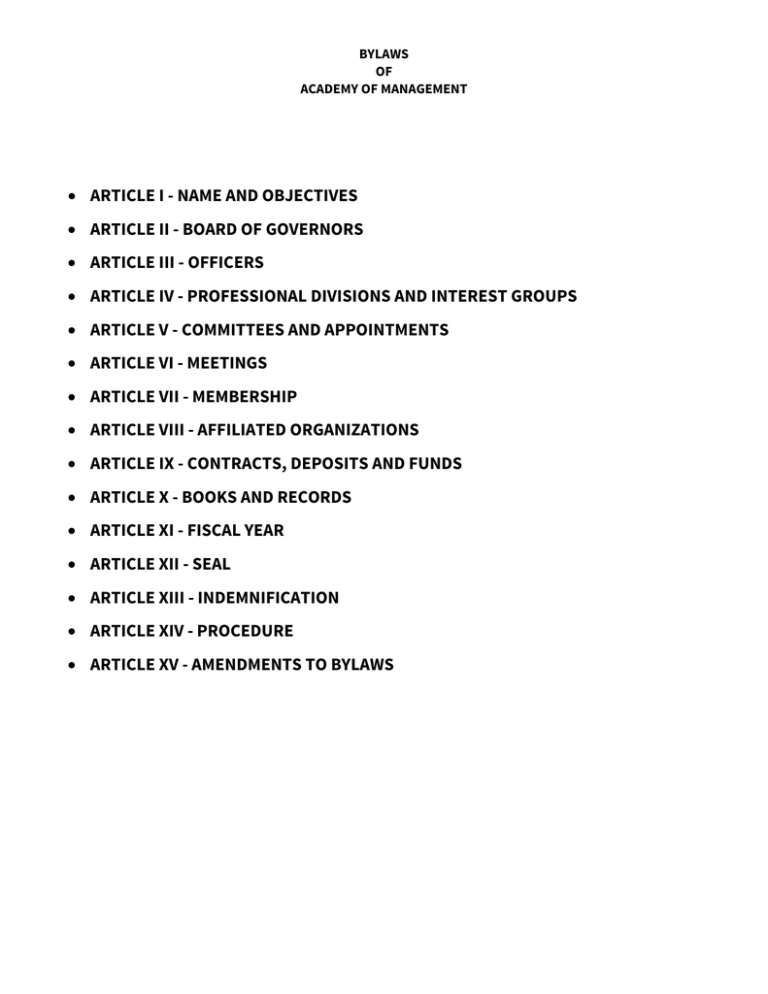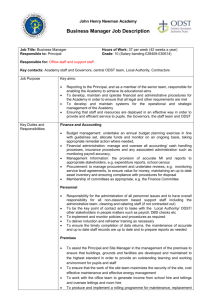ARTICLE I - NAME AND OBJECTIVES ARTICLE III - OFFICERS
advertisement

BYLAWS OF ACADEMY OF MANAGEMENT ARTICLE I - NAME AND OBJECTIVES ARTICLE II - BOARD OF GOVERNORS ARTICLE III - OFFICERS ARTICLE IV - PROFESSIONAL DIVISIONS AND INTEREST GROUPS ARTICLE V - COMMITTEES AND APPOINTMENTS ARTICLE VI - MEETINGS ARTICLE VII - MEMBERSHIP ARTICLE VIII - AFFILIATED ORGANIZATIONS ARTICLE IX - CONTRACTS, DEPOSITS AND FUNDS ARTICLE X - BOOKS AND RECORDS ARTICLE XI - FISCAL YEAR ARTICLE XII - SEAL ARTICLE XIII - INDEMNIFICATION ARTICLE XIV - PROCEDURE ARTICLE XV - AMENDMENTS TO BYLAWS ARTICLE I NAME AND OBJECTIVES 1. 2 Name. The name of this non-profit corporation is the ACADEMY OF MANAGEMENT. It is hereinafter referred to in these Bylaws as the "Academy". Objectives. To further the purpose of the Academy as stated in the Articles of Incorporation, the Academy pursues the following objectives: a. A wider acceptance and closer cooperation among those interested in the science and practice of management. b. Opportunities for scholars who are interested chiefly in particular areas within the general field of management to pursue their specialties. c. Acceptance of management, by the public, educators, and executives, as a distinct leadership activity and an evolving profession, in all fields of organized activity. d. Opportunities for management educators to advance themselves through the publications of scholarly papers, based on their conceptual as well as their research findings. e. The prestige of membership in an organization whose reputation for scholarship and intellectual integrity is unquestioned. ARTICLE II BOARD OF GOVERNORS 1. 2. 3. General Powers. The property, affairs, and business of the Academy shall be managed and controlled by its Board of Governors. The Board of Governors may by general resolution delegate to officers of the Academy and to committees such powers as provided for in these Bylaws. Number, Election and Qualification of Governors. The Board of Governors shall consist of fourteen (14) voting members and those ex-officio, non-voting members designated by the Board. a. The President, President-Elect, Vice President, Vice President-Elect and Immediate Past President, who shall be nominated and elected officers in accordance with Article III(2) of these Bylaws. b. Three (3) elected representatives who have been prominent in the Professional Divisions and nominated on the basis of the Nominating Committee’s judgment; one of these representatives will be elected each year. c. Three (3) elected representatives who have been active in the Academy or its affiliates and who will enhance the Board’s ability to represent the full range of Academy membership, nominated on the basis of the Nominating Committee’s judgment; one of these representatives will be elected each year. d. Three (3) elected representative nominated on the basis of the Nominating Committee's judgment as to potential leadership and contribution to Academy affairs. e. Ex-officio member(s). Ex-officio member(s) include the Academy's Executive Director who shall be a voting member of the Academy and those individual members designated by the Board to be exofficio. Selection and Terms. a. The Chair of the Nominating Committee shall send out to the membership a nominating ballot that calls for each member to nominate two write-in candidates for each representative to be elected. The nominations shall be considered by the Nominating Committee in developing the slate of candidates. The ballot shall contain three nominees for each representative elected. Members with a vote shall be asked to rank candidates for Representative at Large, within each of three candidate groups. Votes for Representative at Large will be tabulated using the Hare Method as described in Article III 2 (a). 4. 5. 6. 7. 8. 9. 10. 11. 12. 13. The ballot for representatives shall accompany the ballot for officers in accordance with Article III 2 (b). b. Elected officers will serve on the Board of Governors so long as they remain an officer of the Academy. c. Elected representatives shall serve a term not to exceed three (3) years. d. Ex-officio members shall serve on the Board so long as they remain qualified according to the section criteria set in Article II(2)(e). Voting. Once elected to the Board, all Governors, except ex-officio members, shall have equal voting privileges on all matters to come before the Board. Resignation. Any Governor may resign at any time by giving written notice to the President. Such resignation shall take effect at the time specified therein, or, if no time is specified, at the time of acceptance thereof as determined by the President or Board of Governors. Removal. A two-thirds (2/3) vote of the number of the Governors established by these Bylaws shall be required to remove a Governor from office prior to the expiration of the term for which that Governor has been elected. In addition, two percent (2%) of the voting membership may petition the Board of Governors to remove any member of the Board. The petition shall be voted upon by the Board. Vacancies. Vacancies among the Governors, whether caused by resignation, death, or removal, may be filled by the remaining Governors at any regular or special meeting. Replacements must satisfy the election criteria of the missing Governor as defined in Article II (2). Meetings. a. The Board of Governors shall provide by resolution the time and place, whether within or without the State of New York, for the holding of the annual meeting of the Board, and any other regular meetings of the Board. b. Special meetings of the Board of Governors may be called by the President, or his/her designee a majority of the voting Governors then in office, who may fix any place, whether within or without the State of New York, as the place for holding any special meeting. Notice. Notice of any special meeting of the Board of Governors shall be given at least seven days in advance by electronic means or written notice to each Governor at his/her address as shown by the records of the Academy. If mailed, such notice is considered delivered when deposited in the United States mail in a sealed envelope so addressed, with prepaid postage. If notice is given by electronic means, notice is considered delivered when the transaction is initiated. Any Governor may waive notice of any meeting. The attendance of a Governor at any meeting shall constitute a waiver of notice of such meeting, except where a Governor attends a meeting for the express purpose of objecting to the transaction of any business because the meeting is not lawfully called or convened. Neither the business to be transacted at, nor the purpose of, any regular or special meeting of the Board of Governors need be specified in the notice or waiver of notice of such meeting, unless specifically required by law or by these Bylaws. Quorum. The presence of a majority of the Board of Governors shall constitute a quorum for the transaction of business at any meeting of the Board. Manner of Acting. The act of a majority of the Governors present at a meeting at which a quorum is present shall be the act of the Board of Governors, unless the act of a greater number is required by law or by these Bylaws. Governors may attend a meeting by telephonic or similar equipment by means of which all persons participating in the meeting can interact with each other or may vote by mail ballot. Informal Action. Any action required by law to be taken at a meeting of Governors, or any action that may be taken at a meeting of Governors, may be taken without a meeting if a consent in writing, setting forth the action so taken, shall be signed by all of the Governors. Compensation. Governors shall not receive any stated salaries for their services as such, but by resolution of the Board of Governors expenses may be allowed for attendance at each regular or special meetings of the Board. ARTICLE III OFFICERS 1. 2. 3. 4. 5. 6. Officers. The officers of the Academy shall be a President, Vice President, President-Elect, Vice PresidentElect, Immediate Past President, Secretary, Treasurer. The Board of Governors may appoint other individuals such as an Executive Director who have the authority to perform duties prescribed by the board. Any two or more offices may be held by the same person, except the offices of President and Secretary. Selection. a. The Vice President-Elect of the Academy shall be elected annually. The Chair of the Nominating Committee shall send out to the membership a nominating ballot that calls for each member to suggest up to two (2) write-in nominees for Vice President-Elect. The Nominating Committee will consider these suggestions seriously when creating election slates. The Nominating Committee will propose a slate of three (3) candidates for Vice President-Elect. i. In choosing candidates, the Nominating Committee will consider prior experience on the Board of Governors, contributions to Academy activities, and/or leadership potential. The election ballot will list all three (3) candidates together, in alphabetical order. All candidates will be provided the opportunity to submit brief written statements indicating (1) their qualifications for the office, (2) their vision for the Academy, and other relevant information as requested. ii. Members with a vote shall be asked to rank all candidates for Vice President-Elect. The ballots shall be tallied through the use of the Hare method. The individual receiving the greatest number of votes shall be the Vice President-Elect. In the event of a tie, the winner will be determined by a runoff election between the tied candidates. b. The ballot, containing candidates for all positions to be elected, shall be mailed at least ninety (90) days in advance of the Annual Meeting. The results of the election shall be announced at the Annual Meeting. c. Annually, if no write-in candidates are elected in their stead, the succession of the remainder of the officers will be as follows: i. Vice President-Elect to Vice President; ii. Vice President to President-Elect; and iii. President-Elect to President. Removal. Any officer may be removed by a two-thirds (2/3) vote of the Governors whenever in their judgment the best interests of the Academy would be served thereby. Such removal shall be without prejudice to the contract rights, if any, of the officer so removed. In addition, two percent (2%) of the voting membership may petition the Board of Governors to remove any officer of the Board. Vacancy. A vacancy in any office because of death, resignation, removal, disqualification, or otherwise, may be filled by the Board of Governors for the unexpired portion of the term. President. The President shall: a. Chair the Board of Governors meetings. b. Be the chief executive officer of the Academy. c. Be responsible for the conduct of the Academy's activities in a manner that will ensure the accomplishment of the Academy's objectives, subject to the provisions of the Constitution and Bylaws, and the concurrence of the Board in matters of policy. d. Preside at all meetings of the Academy, but may delegate this responsibility to the President-Elect or any other individual at his/her discretion. e. Present a report on the status and progress of the Academy at its Annual Meeting. President-Elect. The President-Elect shall: a. Succeed the current President at the termination of the President's year in office. b. Act for the President in case of the President's absence or disability. 7. 8. 9. 10. 11. c. Coordinate the day-to-day operations of the Professional Division Chairpersons and Interest Group Chairpersons. d. Perform such duties as may be assigned by the President or by the Bylaws. Vice President. The Vice President shall: a. Act as Program Chairperson of the Annual Meeting. b. Perform such duties as may be assigned by the President or President-Elect or by the Bylaws. Vice President-Elect. The Vice President-Elect shall: a. Assist the Vice President in preparing the program for the Annual Meeting. b. Perform such duties as may be assigned by the President or Vice President or by the Bylaws. Immediate Past President. The Immediate Past President shall: a. Serve as the Chairperson of the Nominating Committee. b. Perform such duties as may be assigned by the President or by the Bylaws. Treasurer. The Executive Director shall be the Treasurer of the Academy. The Treasurer shall have charge and custody of and be responsible for all funds and securities of the Academy; receive and give receipts for monies due and payable to the Academy and deposit all such monies in the name of the Academy in accordance with the provisions of Article IX of these Bylaws and in general perform all the duties incident to the office of Treasurer and such other duties as from time to time may be assigned by the President or by the Board of Governors. The Treasurer shall be responsible for the administration and oversight of the Academy's financial records. Initiation of an annual review report, compliance with statutory reporting requirements, tax returns, and tax payments. If required by the Board of Governors, the Treasurer shall give a bond for the faithful discharge of his/her duties in such sum and with such surety or sureties as the Board of Governors shall determine. Secretary. The Executive Director shall be the Secretary of the Academy. The Secretary shall keep the minutes of the meetings of the Board of Governors and shall oversee the keeping, preparation, and filing of all other records required by law or by the policies of the Board; be custodian of the corporate records and of the seal of the Academy and see that the seal of the Academy is affixed to all documents, the execution of which on behalf of the Academy under its seal is duly authorized in accordance with the provisions of these Bylaws; keep a register of the post office address of each Governor which shall be furnished to the Secretary by such Governor; and in general perform all duties incident to the office of Secretary and such other duties as from time to time may be assigned by the President or by the Board of Governors. ARTICLE IV PROFESSIONAL DIVISIONS AND INTEREST GROUPS 1. 2. 3. Purpose. The primary purpose of the Professional Divisions and Interest Groups is the encouragement of professional scholarship, its dissemination, and the provision of fellowship among persons of similar academic and professional interest. Authority. The Professional Divisions and Interest Groups operate under the authority of the Board of Governors and carry out member programs , services and activities in a manner consistent with the mission, vision and values of the Academy of Management. a. Division and interest group Chairpersons report to the President-Elect. b. Divisions and interest groups are subject to operational and administrative policies established by the Board of Governors and are periodically reviewed. c. Professional divisions and interest groups shall be governed by their respective memberships in a manner that does not conflict with these bylaws. Definitions. a. Divisions. Divisions represent established bodies of management knowledge where the research focus is firmly rooted and members are regularly making contributions to a body of scholarship which has an independent record in scholarly books, journals and in application to the management field. b. Interest Groups. Members of the Academy may become interested in areas of study not adequately represented by existing Professional Divisions. Upon approval by the Board of Governors, these individuals may form an Interest Group. Interest Groups are organized around emerging trends in management thought and research. Also, they represent an area to which Academy members are beginning to make, or are likely to make, scholarly contributions. i. Interest groups shall be subject to Academy policies and procedures pertaining to their formation, existence, reporting and expiration. ARTICLE V COMMITTEES & APPOINTMENTS 1. Board Committees. The Board of Governors, by resolution adopted by a majority of the entire Board, may designate committees from among its members, each consisting of three or more Governors, and each of which, to the extent provided in the resolution, shall have all the authority of the Board, to the full extent permitted by law. The Board may designate one or more Governors as alternate members of any Board committee, who may replace any absent member or members at any meeting of such committee. The members of such committees shall be appointed by the President of the Academy with the consent of the Board. Board committees shall only have the powers specifically delegated to them by the Board and in no case shall have powers which are not authorized for committees under the Not-for-Profit Corporation Law. The designation of any such committee and the delegation of authority shall not alone relieve any Governor of his/her duty to the Academy under §717 of the Not-for-Profit Corporation Law. Board committees shall be subject to the provisions of the Not-for-Profit Corporation Law applicable to officers which generally shall apply to members of such committees. 2. 2. The Executive Director shall be an ex-officio member of all board committees. Standing Committees. Standing committees are those committees whose existence is perpetual and mandated by the Bylaws. The Academy shall have the following standing committees: a. A Nominating Committee comprised of the President, President-Elect, Vice President, Vice PresidentElect and Immediate Past President who serves as Chairperson. b. An Executive Committee which functions as the fiscal affairs committee and oversees the Academy's Executive Director. The Executive Committee shall be comprised of the President, who serves as chairperson, President-Elect, Vice President, Vice President-Elect and Immediate Past President. Other Committees. Other committees and task forces not having and exercising the authority of the Board of Governors in the management of the Academy may be designated and appointed by resolution adopted by a majority of the Governors at a meeting at which a quorum is present, or by the President as authorized by a like resolution of the Board. Membership on such committees need not be limited to Governors. The President and Executive Director shall be ex-officio members of all committees. a. Term. Each member of a committee shall continue as such until the next annual meeting of the Academy and until his/her successor is appointed, unless the committee is terminated, or unless such member is removed from such committee, or unless such member ceases to qualify as a member thereof. b. Chairperson. Committees shall have chairpersons as determined by the board or committee. c. Vacancies. Vacancies in the membership of any committee may be filled by appointments made in the same manner as provided in the case of the original appointments. d. Manner of Acting. Unless otherwise provided in the resolution of the Board of Governors designating a committee, a majority of the whole committee shall constitute a quorum and the act of a majority of the members present at a meeting at which a quorum is present shall be the act of the committee. 3. Each committee may adopt rules for its own governance not inconsistent with these Bylaws or with rules adopted by the Board of Governors. Appointments. The President with the concurrence of the Board of Governors shall appoint members to head various activities such as newsletter editor, placement services, and other similar positions for terms not exceeding three (3) years, unless otherwise specified by the board. ARTICLE VI MEETINGS 1. 2. 3. 4. Annual Meeting. There shall be an annual meeting of the membership of the Academy, to be held at a time and place to be determined by the Board of Governors. Special Meetings. A special meeting of the members shall be held upon the call of the Board of Governors or the written request signed (within any 60-day period) by one-third of the voting members, at the time and place stated in the call. The call or request for the meeting shall state its purpose or purposes. Notice. All members of the Academy shall be notified of the annual meeting and any special meetings not more than sixty (60) days nor less than ten (10) days before the date of the meeting. In the case of a special meeting, the notice shall state the purpose or purposes for which the meeting is called. Quorum. The presence in person of fifty (50) members of the Academy in good standing, shall constitute a quorum for the transaction of business at any meeting of the members of the Academy. ARTICLE VII MEMBERSHIP 1. 2. 3. Classes. There shall be four (4) classes of membership: Academic, Practitioner, Student, and Emeritus. a. Academic members shall be: A teacher and/or researcher of management in a college, university or research institute; b. Practitioner members shall be: A management consultant or other management practitioner. Practitioner members in the Academy shall be limited to no more than twenty-five percent (25%) of the total membership. A manager is defined as one who spends over fifty percent (50%) of one’s in nonacademic professional management, for purposes of this provision. c. Student members shall: 1. Be graduate students with an interest in the field of management who are not otherwise employed on a full-time basis; and 2. Pay dues at a reduced rate for a maximum of six years or until graduation, whichever comes first; and d. Emeritus members shall: 1. Be retired without full-time employment 2. A member of the Academy for at least the ten years preceding qualification as Emeritus. 3. Pay dues at a reduced rate. Voting. Academic members, Practitioner members, and Emeritus members shall be entitled to vote. Student members do not vote. Dues. a. Amounts. Annual dues will be set by the Board of Governors; b. Payment and Delinquency. All dues will become due and payable on the anniversary date of membership. Only those Board and Committee members whose dues are current will be eligible to remain in their position on said Board or Committee. c. Modifications. Dues amounts are subject to change by a majority vote of the Board of Governors. 4. 5. Application. Application for all classes of Academy membership shall be filed with the Academy National Office. Compliance. Members agree to abide by the AOM’s Code of Ethics. ARTICLE VIII AFFILIATED ORGANIZATIONS 1. 2. Purpose. For the mutual benefit and advancement of the Academy, and in order to further the objectives of the Academy, the Board of Governors may establish relationships with regional groups or other organizations. The Board of Governors may establish such terms and conditions for relating to recognized societies and groups as it considers desirable. Responsibilities. Affiliated Organizations shall foster the objectives of the Academy. Members of the Affiliated Organizations shall strive to implement the professional policies of the Academy among themselves and in the institutions which they serve. Affiliated Organizations may have the privilege of using the insignia of the Academy in accordance with guidelines established by the Board of Governors. Affiliated Organizations may not adopt, publicize, promote or otherwise convey any policy or principle in the name of the Academy which has not been officially adopted by the Academy. Acts of Affiliated Organizations shall in no way commit or bind the Academy, nor shall they create any liability for the Academy unless agreed to in writing by the Board of Governors. 3. 4. Report. Affiliated Organizations shall file periodic reports as may be required by the Board of Governors. Disaffiliation. Affiliated Organizations whose actions are inconsistent with the purpose and objectives of the Academy may be disaffiliated by a majority vote of the Board of Governors. Such action shall be taken after the Affiliated Organization has had an opportunity to respond to a 90-day written notice of the proposed action. ARTICLE IX CONTRACTS, DEPOSITS AND FUNDS 1. 2. 3. Contracts. The Board of Governors may authorize any officer or officers, agent, or agents of the Academy in addition to the officers so authorized by these Bylaws, to enter into any contract or execute and deliver any instrument in the name of and on behalf of the Academy and such authority may be general or confined to specific instances. Deposits. All funds of the Academy shall be deposited from time to time to the credit of the Academy in such banks, trust companies, or other depositories as the Board of Governors may select. Funds. The Board of Governors may accept on behalf of the Academy any contribution, gift, bequest, or devise for the general purposes or for any special purpose of the Academy. ARTICLE X BOOKS AND RECORDS The Academy shall keep complete books and records of account and minutes of the proceedings of its Board of Governors. ARTICLE XI FISCAL YEAR The fiscal year of the Academy shall begin on the first day of January and end on the last day of December. ARTICLE XII SEAL The Board of Governors shall provide a corporate seal which shall be in a form selected by a resolution of the Board of Governors. ARTICLE XIII INDEMNIFICATION Any present or former Governor, officer, or employee of the Academy, or other such persons so designated in the discretion of the Board of Governors, or the legal representative of such person, shall be indemnified by the Academy against all reasonable costs, expenses, and counsel fees paid or incurred in connection with any action, suit, or proceeding to which any such person or his/her legal representative may be made a party by reason of his/her being or having been such a Governor, officer, or employee serving or having served the Academy, except in relation to matters as to which he/she shall be found guilty of negligence or misconduct in respect of the matters in which indemnity is sought and in relation to matters settled or otherwise terminated without a final determination on the merits where such settlement or termination is predicated on the existence of such negligence or misconduct. ARTICLE XIV PROCEDURE The rules contained in the most recent edition of Robert's Rules of Order shall provide the rules of procedure for the Academy where they are not inconsistent with the provisions of the Articles of Incorporation or these Bylaws. ARTICLE XV AMENDMENTS TO BYLAWS 1. 2. Proposals. Proposals for changes to the Bylaws may come from two sources; the Board of Governors and the membership. a. Any board member may propose a change b. Members of the Academy may propose changes to the Bylaws by a petition to the Board supported by ten percent (10%) of the voting members. Amendments. The Board of Governors and the membership can amend the Bylaws. a. The Board of Governors can amend all Bylaws except Articles II and III. Such amendments must be approved by a two-thirds (2/3) vote of the Board. Board initiated amendments to the Bylaws must be announced to the membership within 45 days of the board vote or at the issuance of an all-Academy communication and may not be implemented for forty-five (45) days after the announcement. A petition of 10% of the voting members can require that the amendment be voted upon by the membership. b. Amendments to Articles II and III of the Bylaws must be voted upon by the membership. A majority of the ballots returned is required to adopt any amendment. c. Members may initiate amendments to the Bylaws by a petition signed by 10% of the voting members. Such amendments must be voted upon by the membership.




